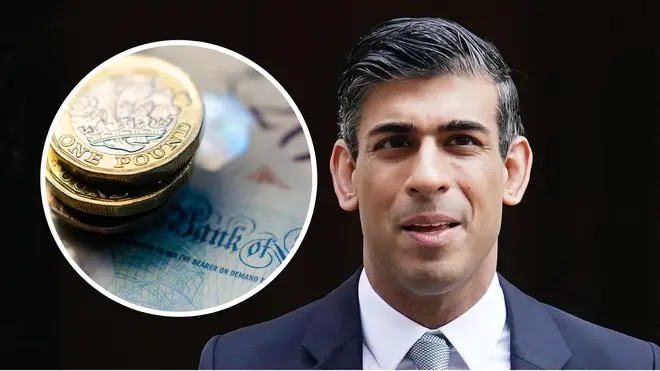
Dom Joly 7pm - 10pm
26 May 2022, 18:58 | Updated: 26 May 2022, 19:00

Fears over whether Rishi Sunak's new windfall tax could make inflation worse have been raised.
The Chancellor confirmed he will tax the big profits made by energy firms to help fund a package for squeezed Brits in the cost of living crisis.
He has now doubled the £200 discount on energy bills to £400 and removed the requirement for it to be repaid, along with payments made to the most vulnerable in society.
The move was welcomed and the head of the Citizens Advice Bureau said it would make a "real difference".
Read more: Sunak gives every household £400 off energy bills after windfall tax U-turn
But speaking to Tonight with Andrew Marr on LBC, the Tory chairman of the Treasury Select Committee and the head of the Institute for Fiscal Studies raised their worries about the effect such a tax could have.
Inflation is the key driver behind the cost of living crisis, with prices soaring – and Paul Johnson, Director of the Institute for Fiscal Studies, said there will be limited effect if the tax is just a one-off.
But he warned the Chancellor will have to resist pressure to keep it to stop things getting worse.
"I think there's some risks with that [making inflation worse]," he said.

'But, look, there's no getting away from it. It is a windfall tax'
"I think if we stop here, and this is just one off, then that should be a limited effect. I think the real risks here are twofold.
"The first is that the Chancellor will come under pressure continually through the year to do more. And in particular, basically what I think will be the most difficult choice he has to make this year which is over public sector pay.
"And if he comes back with more public services in order to fund very big pay rises, I think that could be risky.
"And then secondly, if when it comes to this time next year, what is supposed to be a one off increase in spending turns out to be much more than one off, because he can't resist pressure to do more, then I think put all that together, and then I think we would be worrying about it the inflationary impact quite significantly.
"I'm sure the Bank of England's Monetary Policy Committee will be looking at this really carefully and concerning themselves a bit about the extent to which the Chancellor seems to be blown around by the pressures."
And Mel Stride, the Tory MP who chairs the Treasury Select Committee, said: "I think on the inflation point there is a big question, because transfer payments of this magnitude to struggling families, where they're likely to spend that money fairly quickly...

Citizens Advice Bureau's Clare Moriarty reacts to Rishi Sunak's cost of living support package
"You have to ask the question, what will that do to inflation? Now, the Americans as you may know, did quite a lot of these kinds of transfer payments and it did feed through fairly quickly to additional inflation
"So I think there is a question we asked them and if inflation takes off more aggressively than it has already as a consequence, then you look at monetary policy response being increased interest rates, that increases the servicing costs on our national debt, that puts pressure on the public finances, as well as putting up cost people that have mortgages and so on. There are risks involved."
Earlier on Thursday, Mr Sunak announced plans to give every household in Britain £400 off their energy bills to help ease the cost of living crisis.
He unveiled the temporary 25 per cent windfall tax on oil and gas companies, which will be introduced despite Tory opposition to the idea for weeks, in order to fund the grants.
And a one-off cost of living grant of £650 will also be given to the most vulnerable in society, meaning almost all of the eight million most vulnerable households will receive support of at least £1,200 this year.
Pensioners will be given a one-off £300 payment, while disabled people will get £150.
Clare Moriarty, Chief Executive of the Citizens Advice Bureau, said her group "very much welcome[s] this package, it will make a real difference to the people we see".